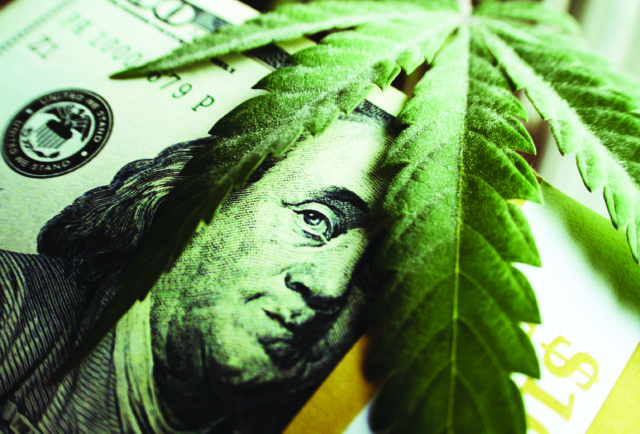
Recreational cannabis likely never would have been legalized in Colorado if it hadn’t been for the tax revenue promised to the state.
It was all part of the sales pitch: Here’s this great plant, that’s also a medicine, it’s non-addictive, impossible to overdose on, yadda yadda yadda… but most importantly, if legalized, it would be highly taxed and strictly regulated. And all of that extra money would go toward improving Colorado’s schools, infrastructure, healthcare and more.
That “sin tax” was an inextricable part of the deal: If people wanted recreational cannabis so bad, they were going to have to pay for it. And the state was going to be the benefactor. As a result, sales tax on retail marijuana is 15%, making cannabis the most heavily taxed product in the state.
A decade later, sales tax revenue from marijuana has lined Colorado’s coffers with more than $2 billion—$423 million in 2022 thus far, dwarfing what alcohol sales brought in. The cannabis industry, for all intents and purposes, is Colorado’s money tree.
But some argue that high taxes on cannabis are fueling black market enterprises, preventing lower-income patients from accessing medicine, and actually hampering the amount of money legal markets could bring in.
Ulrik Boesen, a senior policy analyst at the Tax Foundation, a Washington, D.C.-based think tank, told Forbes in late January that in legal markets across the country, cannabis “very much is” overtaxed.
“If you come at this [from] the perspective that you’re doing it for the revenue, you’re coming at it [from] the wrong angle,” Boesen said. “I think we’ve seen enough that revenue shouldn’t be the reason” for legalization.
Still, states are leaning on cannabis to fund basic government functions like education, law enforcement and healthcare. In Massachusetts, cannabis is subject to a 10.75% excise tax (plus a 6.25% sales tax, and the option for municipalities to add up to 3%), which funds public and behavioral health, public safety and municipal police training, among other things. Like Colorado, California has a 15% excise tax on cannabis, which in part helps to support programs aimed at providing job placement, mental health treatment, substance misuse treatment and legal services for communities disproportionately impacted by the war on drugs. In Illinois, the excise tax is between 10 and 25%, depending on the cannabis product, and supports legal aid, youth development and community reentry for disadvantaged folks.
All of this sounds good, but what happens when—should it ever finally happen—federal legalization adds more taxes to retail pot? Many experts think the legal cannabis levee will break.
In an op-ed for the Denver Post, Mara Sheldon, a member of the Colorado Hemp Association Board of Directors, argues that discussions around federal legalization are creating an environment “riper than ever for the illicit market to take over years of hard work in making medicinal and recreational cannabis legal.”
She points to the Cannabis Administration and Opportunity Act, CAOA, sponsored by Sens. Chuck Schumer (D-NY), Cory Booker (D-NJ) and Ron Wyden (D-OR).
“The senators’ framework bill suggests legalizing cannabis, decriminalizing it and incorporating social equity into the industry,” Sheldon writes. “All have merit but the senators also suggest heavily taxing the industry year over year by creating an excise tax rate of 10% for the first year enacted, increasing to 15%, 20% and 25% thereafter. And in year five they suggest shifting the rate based on quantity sold or milligrams of THC. It is also unclear how the federal excise tax will interact with any state-imposed taxes.
“As a result,” she continues, “consumers in [Colorado] could be paying upwards of 40% on taxes by year four of CAOA, which is outrageous for the industry and consumers, and that doesn’t include what local municipalities impose on the local level either.”
Currently, in America’s patchwork of legalization, high prices on retail marijuana are fueling a black market.
“High prices and a lack of supply are driving many Maine cannabis consumers to the streets, where weed remains much cheaper and plentiful,” David Marino Jr. wrote in a December 2020 article for Bangor Daily News. “[Maine] stands to lose millions in cannabis revenue in the coming years before the recreational supply here catches up with demand and retail prices finally begin to drop for consumers.”
So the concept is simple: A lower sales tax on cannabis would attract more customers, allowing cannabis businesses to grow, hire more employees and make more transactions—all of which represents tax revenue for the state, and less appeal in black market sales.
But the reality is, taxes on products rarely ever go down. And even in recent elections, with initiatives like Proposition 119 on the Colorado ballot in 2021 (News, “Vote Guide 2021” Oct. 7, 2021), it’s clear that cannabis is the easiest (and by far the most lucrative) pot for politicians to reach into to find funding. (Though voters said no to Prop 119.)
Cannabis, as a relatively new industry in the U.S., doesn’t have the same kind of power behind it that other consumer products do, like alcohol or even guns—which makes it an easy target.
But if politicians aren’t careful, they may create a product very few people can afford, and effectively crush the legal market that funds so many valuable programs.














